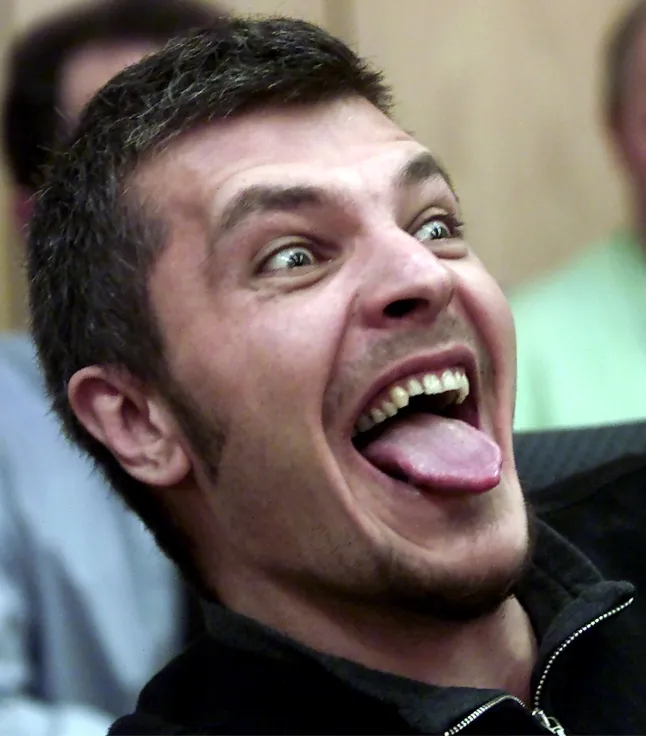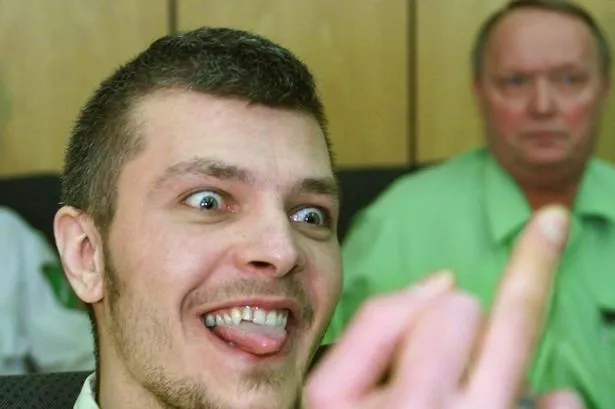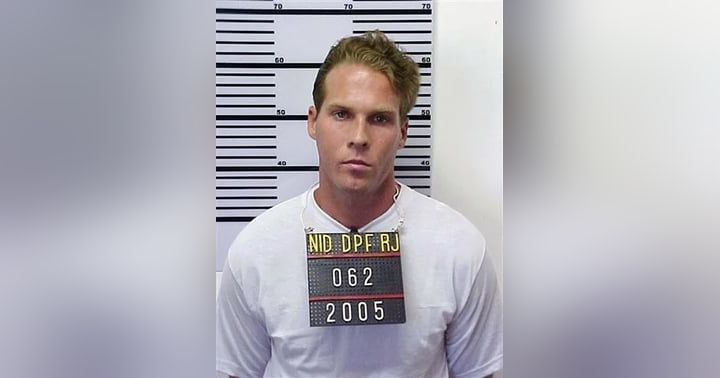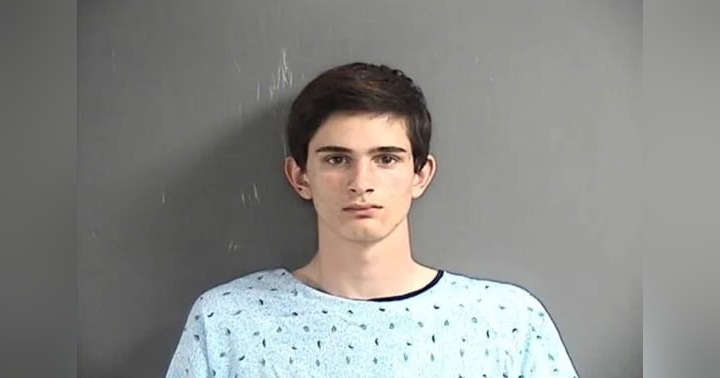Vampires Among Us: The Ritual Murder That Shocked Germany

The Curious Transformation of Manuela Bartel: From Model Student to Chaos Incarnate
Manuela Bartel was the kind of kid who made parents breathe a sigh of relief—polite, hardworking, and bright. Growing up in 1980s and 1990s Germany, her life followed the well-worn path of a typical small-town upbringing: good grades, plenty of friends, and no trouble to speak of. But then, adolescence came knocking, and Manuela didn’t just slam the door on her childhood innocence—she torched it.
For most parents, the teenage years mean a few slammed doors, some questionable outfits, and a curfew rebellion or two. But Manuela? She leveled up in the rebellion game. Her mood swings weren’t just emotional; they were physical. Manuela’s fits of rage were explosive, sometimes spilling out into the streets, where her behavior turned bizarre and terrifying—biting strangers was just another Tuesday for her.
Her baffled parents turned to psychiatrists, hoping for answers. But therapy sessions, evaluations, and even desperate prayers yielded nothing. No one could pinpoint why their once-sweet daughter had morphed into something so unrecognizable.
And then it got worse. Much worse.
From Schoolgirl to “Vampire”: Manuela Bartel’s Descent into the Shadows
Manuela Bartel’s spiral from promising student to self-proclaimed vampire was anything but subtle. It began with her skipping school and swapping her typical teenage wardrobe for the dramatic blacks and heavy eyeliner of gothic fashion. Her parents, bewildered by her transformation, didn’t see the next twist coming: at just sixteen, Manuela packed her things and vanished—not to a friend’s house or a nearby town, but across the Channel to London.
London, with its sprawling subcultures, welcomed Manuela like a moth to its dark, flickering flame. She found work at a Gothic nightclub in Islington, a place where her new aesthetic wasn’t just accepted—it was celebrated. But this wasn’t just about fashion or music for Manuela; her immersion into the gothic scene opened a door to something far darker.
At the club, she mingled with a crowd that didn’t stop at black lipstick and devil horns for Halloween. They embraced the occult, worshiped Satan, and shared a taste for blood—literally. Manuela would later describe how she and other self-identified vampires drank the blood of willing donors during their macabre gatherings. It was thrilling, intoxicating even, to feel connected to this dark, forbidden community. But for Manuela, it still wasn’t enough.
Craving something deeper—or perhaps darker—Manuela left London for Scotland. Her behavior became increasingly extreme: sleeping on graves, performing occult rituals, and, at one point, being buried alive. In her own words, she claimed to have “sold her soul to Satan,” completing her transformation from rebellious teen to a figure who had abandoned all semblance of her former self.
Manuela Bartel’s Return to Germany: From Rebellion to Full-Blown Vampirism
When Manuela Bartel resurfaced in Germany, she wasn’t just a rebellious teen anymore—she was a living, breathing gothic archetype, straight out of a nightmare. By then, her connection to daylight had vanished entirely. She blacked out her apartment windows, transformed her sleep routine to match her nocturnal habits, and chose a coffin as her bed of choice. Subtlety, it seems, had left the building.
Her transformation didn’t stop at lifestyle changes. Manuela went under the needle, shaving part of her head to make space for a tattoo of an inverted crucifix—a bold declaration of her allegiance to the dark. But even that wasn’t enough to complete her evolution. To truly embody the vampire image she craved, Manuela underwent dental modification, replacing two of her teeth with sharp animal fangs.
At this point, Manuela wasn’t just living the gothic lifestyle; she was sculpting herself into its extreme embodiment, becoming a figure that blurred the line between reality and horror fiction. Her return to Germany marked the final phase of her metamorphosis—and set the stage for a dark chapter that would shock the world.
A Match Made in Darkness: The Ad That Changed Everything
Back in Germany, Manuela Bartel’s life took another sharp turn, and this time, it was sparked by a personal ad buried in the pages of a magazine catering to gothic, disillusioned youth. The ad was brief, yet it spoke directly to her morbid sensibilities:
“Vampire seeks Princess of Darkness who hates everybody and everything.”
It was essentially a Lonely Hearts ad wrapped in black velvet and nihilism, but for Manuela, it was an invitation she couldn’t resist. Responding to that ad would change the trajectory of her life forever, setting her on a path of destruction she could never undo.
Experts who later dissected her story often speculated that, had they been left to their own devices, Manuela and the man she was about to meet might have eventually outgrown their gothic obsessions. Adolescence and identity crises fade, after all. But life doesn’t often give people such neat endings. Manuela answered the ad—and met Daniel Ruda.
Together, they would form a duo that would drag their shared fantasies into horrifying reality, ensuring that neither would ever escape the darkness they had embraced.
The Making of Daniel Ruda: From Isolation to Obsession
Daniel Ruda grew up isolated and angry, never fitting in and recoiling from even basic human connections. In search of purpose, he first turned to Neo-Nazism, finding fleeting camaraderie during the 1998 general election. Disillusioned by the movement’s failure, he abandoned it and dove into Germany’s gothic and black metal scene.
In this dark subculture, Daniel embraced blood-drinking rituals and followed his favorite band, Bloodsucking Freaks, across the country. But even this macabre community couldn’t satisfy him. Desperate for deeper meaning, he placed a personal ad:
“Vampire seeks Princess of Darkness who hates everybody and everything.”
Manuela Bartel answered, setting the stage for their deadly partnership.
A Match Made in Darkness
Daniel and Manuela’s connection was instant and disturbing. They fully embraced their shared obsession with darkness and the occult, creating a life together where Daniel worked a mundane job by day, and Manuela lived out her vampiric fantasies in their lightless apartment, complete with a coffin bed.
Their delusion escalated when Daniel claimed to receive a satanic vision: they were to marry on June 6th and die on July 6th to earn eternal seats beside Satan. But first, they needed a sacrifice.
For Daniel and Manuela, the question wasn’t whether to kill—it was who to choose. That decision would soon seal their fate.
How Frank Haagen Became the Target
For Daniel and Manuela, their satanic devotion required one final act: a blood sacrifice. Manuela’s isolated lifestyle meant few potential victims, so the couple turned to someone they both knew—Frank Haagen.
Frank, a kind and open-minded colleague of Daniel’s, had met Manuela and didn’t judge their eccentric lifestyle. But his good nature made him the perfect choice in their twisted logic. Frank’s humor and personality led them to label him as Satan’s future “court jester.”
In their eyes, Frank wasn’t just a victim—he was the key to their eternity in Hell.
Frank Haagen’s Tragic Final Moments
On July 6th, Frank arrived at Daniel and Manuela’s apartment, expecting a casual evening with friends. Instead, he walked into a trap.
While they sat on the sofa, Daniel struck Frank twice with a hammer. Disoriented but alive, Frank stumbled toward the television, only to be met with Manuela’s blade. Convinced she was following a divine order, she stabbed Frank 66 times.
The depravity didn’t stop there. They carved a pentagram into his stomach, drank his blood, and completed their ritual by having sex beside his body in Manuela’s coffin.
Frank’s death wasn’t just a sacrifice—it was a horrifying descent into their delusions.
A Change in Plans
With Frank’s blood spilled, the couple believed their mission was nearly complete. All that remained was their own departure from the mortal world, sealing their pact with Satan. Initially, they planned to slit their wrists, but the thought of staging a fatal accident with a truck crossed their minds. For reasons unknown, neither plan materialized. Instead, Daniel and Manuela fled.
Their disappearance might have gone unnoticed, but Manuela sent a goodbye letter to her parents. Alarmed, her family contacted the authorities. When police arrived for a welfare check, they discovered a scene straight out of a horror movie. Frank’s mutilated body was decomposing in the apartment, the scalpel still protruding from his stomach.
The Arrest and Chilling Confessions
A nationwide manhunt quickly ensued, and the couple was apprehended on July 12th in another city. Daniel initially claimed he had no memory of the murder, but Manuela was more forthcoming. She laid out the details with chilling matter-of-factness, openly explaining the ritual and their belief that the act was an order from Satan.
“I got the order to sacrifice a human for Satan,” Daniel declared during his statement.
Manuela echoed the sentiment. “It was not murder. We are not murderers. It was the execution of an order.”
What followed would be one of the most bizarre and unsettling murder trials in modern German history.
A Trial Like No Other: The Dark Spectacle of Daniel and Manuela Ruda
The trial of Daniel and Manuela Ruda was less about legal proceedings and more about theater—a twisted, gothic performance that horrified and fascinated onlookers in equal measure. Dressed in their signature gothic attire, the couple turned the courtroom into a stage for their macabre beliefs. They shared passionate kisses in front of the cameras, flashed Satanic hand gestures, and seemed to revel in the chaos they had created.
Manuela, fully committed to her nocturnal persona, even requested that the courtroom windows be blacked out, claiming the sunlight hurt her eyes. While the judge denied this bizarre request, she was permitted to wear sunglasses throughout the trial, further adding to the surreal atmosphere.
Daniel’s Disturbing Logic
Daniel, never one to shy away from the spotlight, took to the stand with an argument that left the courtroom stunned. Comparing himself to a car involved in an accident, he declared:
“If I kill a person with a car and half his bleeding head is hanging on the radiator grill, the car is not put on trial. The driver is the bad one. I have no reason to regret anything because I have not done anything.”
His statement underscored the couple’s shared belief that they were mere instruments of Satan, absolved of personal responsibility by the supposed divine order they claimed to follow.
Sentencing and the Aftermath
Despite their theatrics and pleas for leniency on the grounds of mental disturbance, the judge saw through their facade—though not without some measure of compromise. Daniel was sentenced to 15 years, and Manuela received 13 years, both to be served in the psychiatric unit of a prison. The court also forbade them from ever seeing each other again. Their bond, which had brought them together in the name of darkness, dissolved shortly after the trial, culminating in a divorce.
In the years that followed, Daniel remained defiant. He penned a book about the murder, a move that not only shocked the public but also ensured his request for early release was denied. To this day, Daniel remains behind bars, refusing to participate in therapy sessions—a requirement for his potential release.
Manuela, on the other hand, appears to have taken a different path. She engaged in therapy, reportedly coming to terms with the gravity of her actions. After serving her sentence, she was released, her current whereabouts shrouded in mystery. Whether she has left her dark past behind remains an unanswered question.
A Legacy of Horror
The story of Daniel and Manuela Ruda is more than a tale of violence—it’s a haunting exploration of belief, alienation, and the devastating consequences of delusion. Their trial and aftermath left a scar on Germany’s criminal history, a grim reminder of how far obsession can take us when left unchecked.














